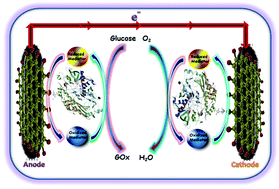
Abstract
The excellent electrical conductivity and ease of functionalization make graphene a promising material for use in enzymatic bioelectrodes and biofuel cells. Enzyme based biofuel cells have attracted substantial interest due to their potential to harvest energy from organic materials. This review provides an overview of the functional properties and applications of graphene in the construction of biofuel cells as alternative power sources. The review covers the current state-of-the-art research in graphene based nanomaterials (physicochemical properties and surface functionalities), the role of these parameters in enhancing electron transfer, the stability and activity of immobilized enzymes, and how enhanced power density can be achieved. Specific examples of enzyme immobilization methods, enzyme loading, stability and function on graphene, functionalized graphene and graphene based nanocomposite materials are discussed along with their advantages and limitations. Finally, a critical evaluation of the performance of graphene based enzymatic biofuel cells, the current status, challenges and future research needs are provided.
Source >> Nanoscale Journal, issue 16, 2015